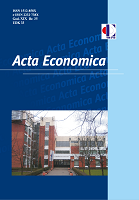INTERDEPENDENCE OF FISCAL CONSOLIDATION AND ECONOMIC GROWTH IN EU COUNTRIES WITH DIFFERENT LEVELS OF DEVELOPMENT
INTERDEPENDENCE OF FISCAL CONSOLIDATION AND ECONOMIC GROWTH IN EU COUNTRIES WITH DIFFERENT LEVELS OF DEVELOPMENT
Author(s): Biljana GojkovićSubject(s): Economic development, Public Finances, Fiscal Politics / Budgeting
Published by: Економски факултет Универзитета у Бањој Луци
Keywords: public finances; fiscal consolidation; primary balance; public debt;
Summary/Abstract: The concept of fiscal consolidation is most often mentioned during major economic crises, which are usually the result of economic shocks caused by crises such as the one in 2008, but also the last crisis caused by the COVID-19 pandemic. In such circumstances, as a rule, high deficit and/or enormous growth of public debt occur. Therefore, many countries need to consolidate fiscally their public finances. In this paper, the focus of the analysis is on the impact of fiscal consolidation on the economic growth of the European Union with different levels of development. It is assumed that countries with low incomes and less developed economies have a special obligation and a need for stable public finances. The same refers to the small and open economies that are largely exposed to the stability/instability of the surrounding countries. Therefore, it is very important that countries with a low level of development pay special attention to the fiscal stability of the country’s public finances.
Journal: Acta Economica
- Issue Year: 19/2021
- Issue No: 35
- Page Range: 97-113
- Page Count: 17
- Language: English

